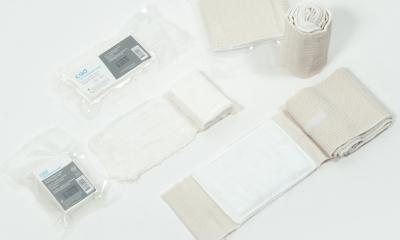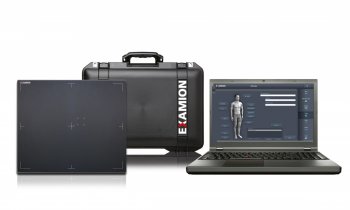Accidents? We can all make mistakes!
Never apply a tourniquet to a bleeding limb!
Paramedics and other first-aid workers are often confronted with severe bleeding that can be arrested relatively easily. However, inappropriate approaches are frequent, and sometimes even increase bleeding, or cause other damage to the victim. Medical journalist Karl Eberius MD, asked Dr Edgar Biemer MD, of the Praxisklinik Dr Caspari hospital, in Munich, Germany, and the former head of the Department of Plastic, Reconstructive and Aesthetic Surgery at Munich Technical University, about those inappropriate actions, why they should be avoided, and what should be done for better results

‘Heavy bleeding from any part of the body should always be arrested using a local pressure bandage,’ Dr Biemer advised. ‘If the initial bandage becomes saturated with blood, it should not be removed at the accident site and replaced with a new bandage. Instead a second bandage should be applied on top of the first one. In addition, the affected limb should be elevated as much as possible, so as to reduce bleeding by reducing perfusion pressure in the afferent arteries. Sterile bandages should be used whenever possible. If they are not available, a freshly laundered towel can be used instead. Of course, in an emergency, any material can be used that is to hand, including the patient’s own shirt.
It is often recommended that local compression should be applied manually to the afferent artery if a local compression bandage doesn’t arrest the bleeding. However, Dr Biemer pointed out: ‘Inasmuch as local compression successfully arrests bleeding in virtually all cases, applying compression to an afferent artery in regions such as the underarm or groin is unnecessary and has no effect. Moreover, applying pressure to an artery is no easy matter from a practical standpoint. In the case of a leg injury, for example, you’d need to apply pressure to the pelvic artery during the whole trip to the hospital.’
Asked to summarise the kind of errors frequently made at an accident site, Dr Biemer said: ‘Under no circumstances should tourniquets or the like be used on bleeding limbs because, in more than 90% of cases, this method provokes venous occlusion and thus worsens the bleeding. This is the most prevalent error.
‘Additionally, clamps should never be applied to an artery in a wound to arrest bleeding, particularly in the case of severed limbs, for which replantation is still possible. Applying such clamps can provoke massive arterial damage that ultimately makes it necessary to clip two to three centimetres off the artery and implant an arterial interponate, which further complicates the situation and impedes healing of the replanted limb. In such cases, the basic principle is to avoid manipulation of the wound as much as possible, except to apply a pressure bandage.
‘In cases of severe bleeding, the affected area should be laid flat and the patient’s head should be lowered, to offset any lack of cerebral perfusion resulting from blood loss. In addition, venous accesses should be performed as soon as possible, to allow for blood transfusions in cases of substantial blood loss.’
Drug administration can also cause problems, he said. ‘No drugs of any kind should be used to arrest bleeding at an accident site. Nor should cotton wool, or the like, be used to try to stop bleeding, because such products generally have no appreciable effect and often engender wound residues that are difficult to remove.’
01.07.2009





